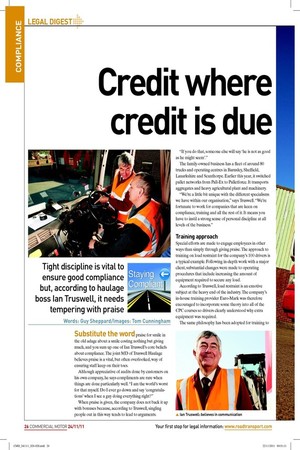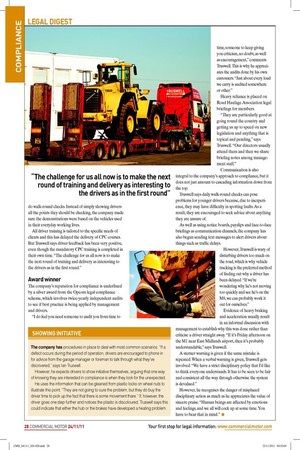Credit where credit is due
Page 20

Page 22

If you've noticed an error in this article please click here to report it so we can fix it.
Tight discipline is vital to ensure good compliance but, according to haulage boss Ian Truswell, it needs tempering with praise
Words: Guy Sheppard/Images: Tom Cunningham Substitute the word praise for smile in the old adage about a smile costing nothing but giving much, and you sum up one of Ian Truswell’s core beliefs about compliance. The joint MD of Truswell Haulage believes praise is a vital, but often overlooked, way of ensuring staff keep on their toes.
Although appreciative of audits done by customers on his own company, he says compliments are rare when things are done particularly well. “I am the world’s worst for that myself. Do I ever go down and say ‘congratulations’ when I see a guy doing everything right?” When praise is given, the company does not back it up with bonuses because, according to Truswell, singling people out in this way tends to lead to arguments. “If you do that, someone else will say ‘he is not as good as he might seem’.” The family-owned business has a leet of around 80 trucks and operating centres in Barnsley, Shefield, Lanarkshire and Scunthorpe. Earlier this year, it switched pallet networks from Pall-Ex to Palletforce. It transports aggregates and heavy agricultural plant and machinery.
“We’re a little bit unique with the different specialisms we have within our organisation,” says Truswell. “We’re fortunate to work for companies that are keen on compliance, training and all the rest of it. It means you have to instil a strong sense of personal discipline at all levels of the business.”
Training approach
Special efforts are made to engage employees in other ways than simply through giving praise. The approach to training on load restraint for the company’s 100 drivers is a typical example. Following in-depth work with a major client, substantial changes were made to operating procedures that include increasing the amount of equipment required to secure any load.
According to Truswell, load restraint is an emotive subject at the heavy end of the industry. The company’s in-house training provider Euro-Mark was therefore encouraged to incorporate some theory into all of the CPC courses so drivers clearly understood why extra equipment was required.
The same philosophy has been adopted for training to do walk-round checks. Instead of simply showing drivers all the points they should be checking, the company made sure the demonstrations were based on the vehicles used in their everyday working lives.
All driver training is tailored to the speciic needs of clients and this has delayed the delivery of CPC courses. But Truswell says driver feedback has been very positive, even though the mandatory CPC training is completed in their own time. “The challenge for us all now is to make the next round of training and delivery as interesting to the drivers as in the irst round.”
Award winner
The company’s reputation for compliance is underlined by a silver award from the Opcom legal compliance scheme, which involves twice-yearly independent audits to see if best practice is being applied by management and drivers.
“I do feel you need someone to audit you from time to time, someone to keep giving you criticism, no doubt, as well as encouragement,” comments Truswell. This is why he appreciates the audits done by his own customers. “Just about every load we carry is audited somewhere or other.” Heavy reliance is placed on Road Haulage Association legal brieings for members.
“They are particularly good at going round the country and getting us up to speed on new legislation and anything that is topical and pending,” says Truswell. “Our directors usually attend them and then we share brieing notes among management staff.” Communication is also integral to the company’s approach to compliance, but it does not just amount to cascading information down from the top.
Truswell says daily walk-round checks can pose problems for younger drivers because, due to inexperience, they may have dificulty in spotting faults. As a result, they are encouraged to seek advice about anything they are unsure of.
As well as using notice boards, payslips and face-to-face brieings as communication channels, the company has also begun sending text messages to alert drivers about things such as trafic delays.
However, Truswell is wary of disturbing drivers too much on the road, which is why vehicle tracking is the preferred method of inding out why a driver has been delayed. “If we’re wondering why he’s not moving too quickly and see he’s on the M6, we can probably work it out for ourselves.” Evidence of heavy braking and acceleration usually result in an informal discussion with management to establish why this was done rather than criticise a driver straight away. “If it’s Friday afternoon on the M1 near East Midlands airport, then it’s probably understandable,” says Truswell.
A sterner warning is given if the same mistake is repeated. When a verbal warning is given, Truswell gets involved. “We have a strict disciplinary policy that I’d like to think everyone understands. It has to be seen to be fair and consistent all the way through otherwise the system is devalued.”
However, he recognises the danger of misplaced disciplinary action as much as he appreciates the value of sincere praise. “Human beings are affected by emotions and feelings, and we all will cock up at some time. You have to bear that in mind.” ■













































